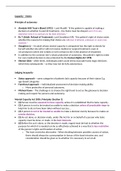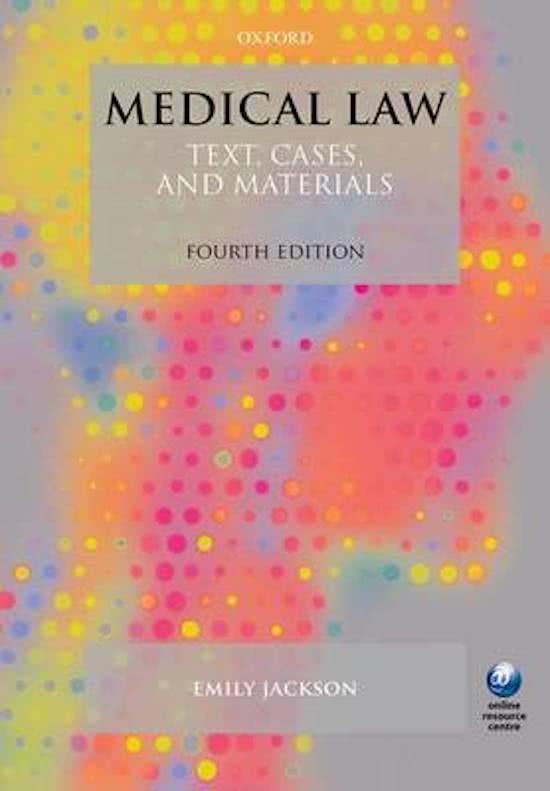Capacity – Notes
Principle of autonomy
Airedale NHS Trust v Bland [1993] – Lord Mustill: “If the patient is capable of making a
decision on whether to permit treatment… his choice must be obeyed even if on any
objective view it is contrary to his best interests.”
Re T (Adult: Refusal of Treatment), Lord Donaldson MR: “the patient's right of choice exists
whether the reasons for making that choice are rational, irrational, unknown or even non-
existent.”
Staughton LJ – An adult whose mental capacity is unimpaired has the right to decide for
herself whether she will or will not receive medical or surgical treatment, even in
circumstances where she is likely or even certain to die in the absence of treatment.
In addition to the common law’s robust protection of autonomy, the patient’s right to make
her own medical decision is also protected by the Human Rights Act 1998.
Shimon Glick – often times, individuals under acute stress may take hasty tragic decisions
which they subsequently – so they may not be fully autonomous.
Judging incapacity
Status approach – some categories of patients lack capacity because of their statue E.g.
age-based categories
Functional approach – Individualised assessment of decision-making ability
o More protective of personal autonomy.
Micheal Gunn – The challenge is to choose the right level to set as the gateway to decision
making and respect for persons and autonomy.
Mental Capacity Act 2005, Principles (Section 1)
(2) Person must be assumed to have capacity unless it is established that he lacks capacity.
(3) A person is not to be treated as unable to make a decision unless all practicable steps to
help him to do so have been taken without success….
(4) A person is not to be treated as unable to make a decision merely because he makes an
unwise decision.
(5) An act done, or decision made, under this Act for or on behalf of a person who lacks
capacity must be done, or made, in his best interests.
(6) Before the act is done, or the decision is made, regard must be had to whether the
purpose for which it is needed can be as effectively achieved in a way that is less restrictive
of the person’s rights and freedom of action.
o The least restrictive alternative - When deciding between possible courses of action,
there should always be a presumption in favour of the least intrusive one, and
consideration should be given as to whether it is necessary to act at all.
, o A Local Authority v K, Cobb J: It is my judgement that sterilisation would be a
disproportionate step to achieve contraception for K in the future. Plainly risk
management is better than invasive treatment, it is less restrictive.
What is incapacity?
2(1) For the purposes of this Act, a person lacks capacity in relation to a matter if at the
material time he is unable to make a decision for himself in relation to the matter because
of an impairment of, or a disturbance in the functioning of, the mind or brain.
o This is binary which is problematic because usually these people are on a spectrum
as opposed to incapable or capable.
3(1) … a person is unable to make a decision for himself if he is unable—
o to understand the information relevant to the decision,
o to retain that information,
o to use or weigh that information as part of the process of making the decision, or
o to communicate his decision (whether by talking, using sign language or any other
means).
Heart of England NHS Foundation Trust v JB: Judge found that all that was necessary was
that JB had a ‘broad, general understanding’ of the benefits and risks of amputation, rather
than a more detailed understanding of the relative risks of different types of amputations.
o Important that patients are not disqualified from making decisions for themselves
because they cannot understand all of the possible ramifications of a relatively
simple decision.
o A Local Authority v A: woman understood contraceptive injection will involve,
rather than needing to have a full understanding of what it would be like for her to
have a baby.
The right to take irrational decisions?
MCA Principles: A person is not to be treated as unable to make a decision merely because
he makes an unwise decision.
o Sometimes it is difficult to distinguish between a person’s bizarre decisions and
irrational wishes and a person’s inability to use and weigh information.
CF needs to be able to weigh information
The Mental Health Trust v DD [2014], Cobb J: Her decision-making is undoubtedly
“unwise”, but it is not, in my judgment, just “unwise”; it lacks essential characteristic of
discrimination which only comes when relevant information is evaluated, and weighed.
o I am satisfied that in relation to each of the matters under consideration her
impairment of mind (essentially attributable to her autistic spectrum disorder,
overlaid with her learning disability) prevents her from weighing the information
relevant to each decision.





